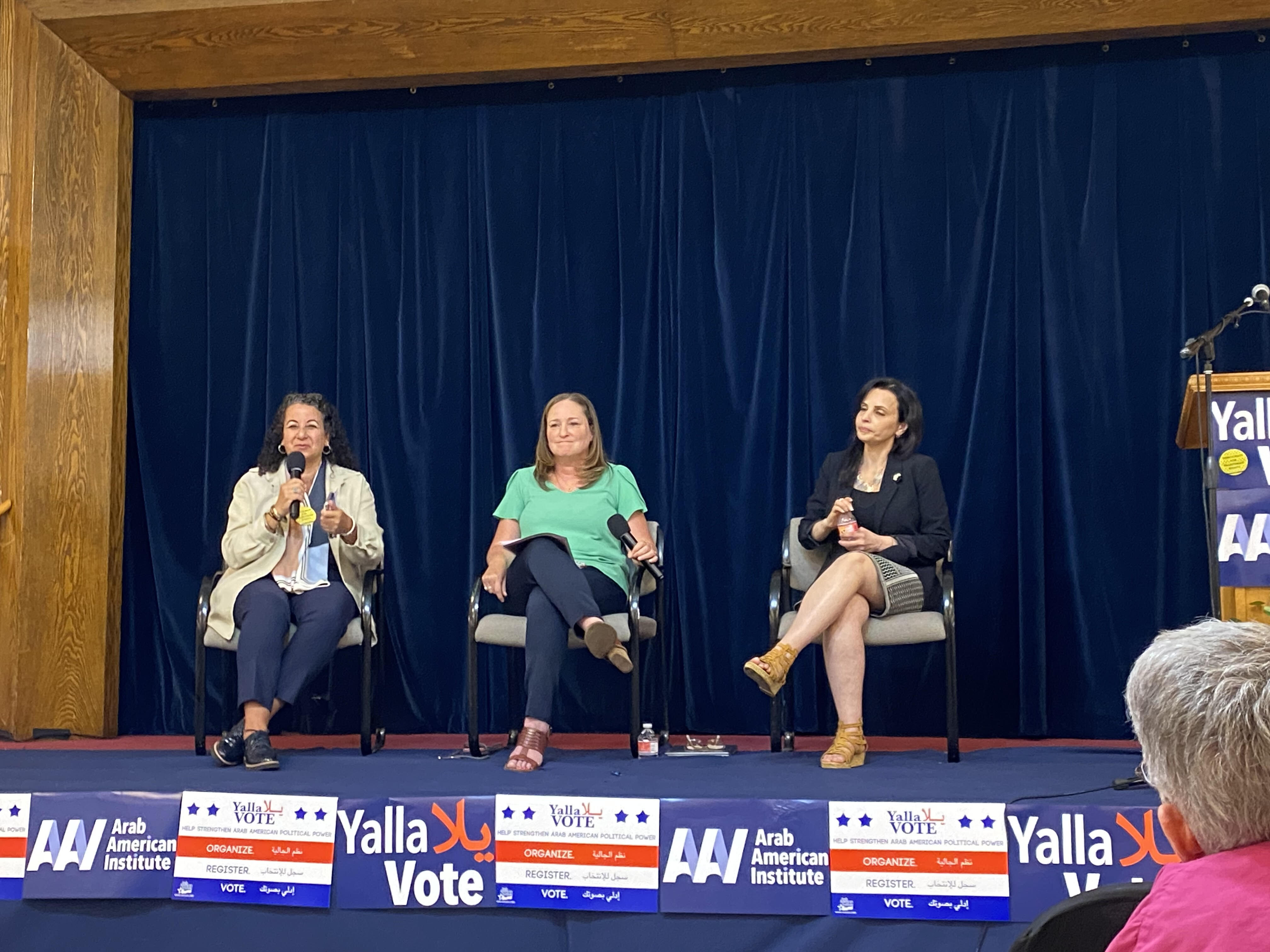CHICAGO — Several Arab and Muslim leaders, human rights experts and humanitarian officials stressed on Tuesday that if Democrats are serious about getting more aid into Gaza, they must resume U.S. funding for the United Nations agency responsible for keeping Palestinians alive.
At two events held Tuesday in Chicago by the Arab American Institute and the Institute for Middle East Understanding — events scheduled alongside, but separate from, the official Democratic National Convention programming — panelists spoke of the ongoing humanitarian crisis brought on by Israel’s nearly year-long U.S.-backed military campaign in Gaza, which much of the international community has labeled a genocide.
Israeli officials have “said anybody born in Gaza is born a terrorist. They’re animals, they’re snakes. There can’t be an innocent child in Gaza,” said Mara Kronenfeld, executive director for UNRWA USA, the committee that oversees U.S. support for the agency. “That rhetoric allows you to decimate an entire population.”
UNRWA has served as the primary aid resource for millions of Palestinians ever since they were violently exiled 75 years ago, in an event they refer to as the Nakba, to make room for the newly created state of Israel. The Palestinian population in Gaza has relied heavily on the organization for health care, education, civic planning and food assistance for years — and even more so since Israel launched its offensive last year, in response to a deadly attack on Israel by Hamas militants on Oct. 7.
Many aid workers in Gaza are themselves Palestinian, causing Israeli officials and their allies to dehumanize them, speakers said on Tuesday. More than 200 UNRWA staff members have been killed in Gaza, though those deaths have not brought about the same widespread condemnation by Western countries as the the killings of seven aid workers with nonprofit World Central Kitchen earlier this year.
“It was so traumatizing for us to have known colleagues who were killed, who’ve been killed,” Kronenfeld told HuffPost. “We knew some of those people. We’d met them.”

Several smaller aid organizations have been forced to halt their humanitarian services in Gaza after their workers were killed by Israeli forces, which continue to allow only a sliver of aid trucks into the enclave.
In February, Israel accused a handful of UNRWA’s thousands of employees — 0.0003%, according to Kronenfeld — of having participated in the Oct. 7 attack. Despite the agency immediately firing the accused staff members and launching an investigation, most of UNRWA’s biggest financial supporters like the U.S. temporarily suspended hundreds of millions in funding, leaving the agency and the Palestinians it helps without life-saving resources.
But since then, an independent UN report concluded that Israel did not provide sufficient evidence to support its accusation against UNRWA. Every country that temporarily paused its funding has resumed it — except for the U.S., which had been UNRWA’s largest financial supporter. Congress passed legislation to suspend funding to UNRWA until at least March of next year.
UNRWA is the only humanitarian agency big enough to be able to distribute mass amounts of aid to Gaza residents, though the killings of staff and a lack of funding are threatening its ability to do so. Since October, the Israeli offensive has killed at least 40,000 Palestinians, many of them children, and the lack of aid in Gaza has led to displacement, starvation, disease, an educational black hole and a reproductive health crisis.
“In reality, UNRWA represents an uncomfortable truth that its detractors don’t want to accept: UNRWA is targeted because of its role in keeping Palestinians alive, because of its role in safeguarding the rights of Palestine refugees, and because it embodies the international community’s commitment to a just and lasting political solution,” Kronenfeld said.
“In essence, UNRWA is being attacked precisely because it keeps alive two essential truths,” she continued. “One, the very existence of a Palestinian refugee; and alongside it, the promise of a future Palestinian state.”
Disclaimer: The copyright of this article belongs to the original author. Reposting this article is solely for the purpose of information dissemination and does not constitute any investment advice. If there is any infringement, please contact us immediately. We will make corrections or deletions as necessary. Thank you.
